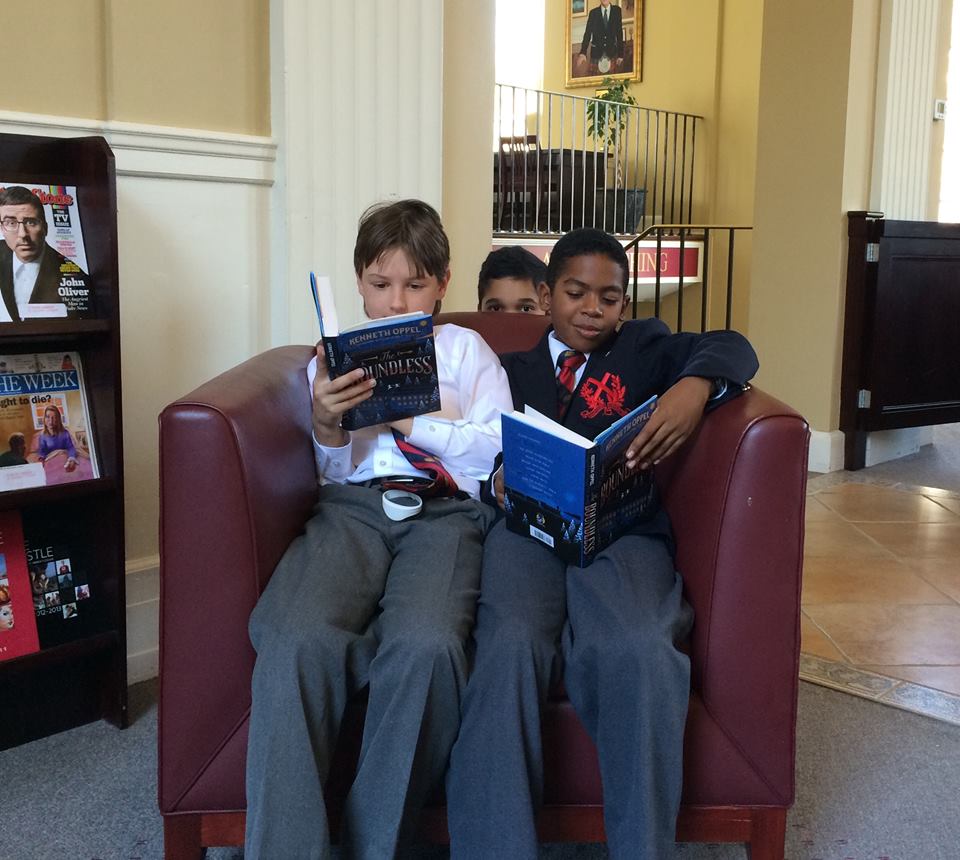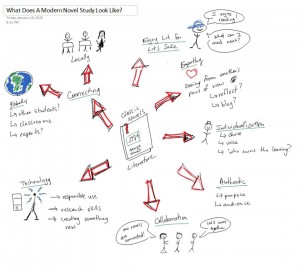“It is what you read when you don’t have to that determines what you will be when you can’t help it.” – Oscar Wilde
Since I was little, I have enjoyed reading for reading’s sake. Reading literature has provided many things for me over the years: an escape, a challenge, a point of discussion, a feeling of being rooted to the experience of being human. Now I make my living through reading. Although my primary teaching assignment (and first love!) is history, I have also been made into a Language Arts teacher as a result of shifting course coverage needs. I often lament the fact that I have to teach LA and most of my ego battles this reality every September, but a small part of me enjoys the fact that I get to share my love of reading with a group of grade 7 boys, a challenging audience at the best of times.
For months now I have been having an internal conversation about what should be the focus of my C21 action plan. I have vacillated between working through a faculty PD initiative and improving my work in the history classes that I love to teach. If I’m honest with myself, those projects would be the path easily travelled. Ultimately, I have decided to take on a challenge, instead (this growth mindset thing must be catching!). When training for triathlon, coaches regularly remind athletes that despite the enjoyment they get out of training in the discipline that they enjoy most, their overall fitness will benefit more from an intense focus on areas of weakness. I guess this means that I am going to be diving in head first.
So far this year, we have completed one novel study, which many of the students enjoyed. We all read the same text and worked through the usual skills of literary device identification, meaning-making and responding to the text. I’m sure the boys would say it was the usual gamut of novel study tasks. There was nothing particularly inspiring about any of the work we did. Did it even inspire them to read the sequel? I think the resounding answer would be nope….
So what does it take? How do we get a maximum buy-in for reading literature? Can it be helped along by how we treat reading literature in the classroom? How do we bring literature to students today in a way that has meaning?
Based on recent research, it would seem worth the the attempt. If exposing students to literary fiction helps to open their eyes and be more tolerant of others then it seems a worthy cause to me. If it helps them to be more mindful in their daily interactions at a biological level, then it is deserving of our attention as educators. But at a more fundamental level, I believe this is important.
When I meet the parents of my Language Arts students each September, I tell them that my first priority this year will be to encourage their sons to not hate LA. I always see nods of approval for this goal because at grade 7, many of their boys are losing (or have lost) their interest in reading. This year, that goal felt uninspiring, and maybe even a little defeatist. So I’m going to try to level up here. I’m going to try to build a definition for a modern novel study. Because this plan has only begun to take shape in my brain, I don’t have the road map yet. I’ll be leaning in to see how Graham Vogt is doing with his plan to improve the culture of reading at Rothesay Netherwood School and welcoming the thoughts and suggestions of the rest of my C21 friends. Please comment and share you successes and failures with teaching literature to this generation of students! I’ve sketched out some of my hopes here, because it’s how my brain works best. I’ll also be trying to match this with my work in PBL and using technology to boost engagement and student connections. I am prepared to face failure. That’s it. Let’s go!


I love that you are exploring how to inspire “what can i read next?”. I think that this is related to a worthwhile goal for all educators – to be reflecting on ways to inspire the students to discover that the learning never ends! For the students to be motivated to always be questioning and thinking “what next?” instead of waiting for “what next” to be handed to them. I look forward to reading about your journey!
You are courageous! I love it, especially the triathlon reference! I think you’ve got some great ideas sketched. I think having students drive through Voice and Choice as you mentioned is a good start. My partner teaches English now and they are reading two books at once, a book of their choosing and Shakespeare, and they will be comparing/contrasting the two. I think that an exciting next step would be to connect with literary minds on Twitter and get your students to engage in conversation. Perhaps even host a couple of hangouts! I wish we still had grade 7, because we would have loved to partner with you! Doc Appender might be a great way for you to get at reading journals and reflections by keeping everything in one place. Check it out https://www.youtube.com/watch?v=DDjPreGtr0k I can show you how I use it on Friday at MaRS!
Melissa – this is a great post, and an awesome action plan! As an intermediate LA teacher, I look forward to reading about your journey.
I wrote a blog post earlier in the year about my novel study unit (and my attempt to put a more “modern twist” on it). It wasn’t perfect, but you can read more about the unit (the successes and the challenges) here: http://cohort21.com/allisonharding/2014/11/11/to-blog-or-not-to-blog-that-is-the-question/.
Best of luck!
This looks awesome Melissa, and I’m excited to connect throughout our experiences. There’s comfort in not doing this alone!
Derek brings up an important point, that this idea of building a reading life does not necessarily mean abandoning the curriculum texts. The approach that I will use and, I think the one that he’s referring to, is that of a using a “model text’. Through the curriculum text you model approaches of reading and analysis that they can then practice with their independent novels. Perhaps they keep a reading journal in some form to capture their learning experiences?
Gallagher speaks often of getting in the reading zone – that feeling that all readers know of being completely absorbed in a book and the rest of life sort of falls away. He contends that if students can realize that experience, they will be transformed. So, how do we facilitate that experience for them?
I look forward to chatting tomorrow!
Melissa, this is a great action plan. More importantly, your effort to give the students choice as a means to improve ownership by the students of what they are reading is always helpful when trying to get them understand WHY they are reading too.
Let’s stay in touch on this. Great challenge.
Melissa,
You are Language Arts teacher after my own heart. From moving from Grade 6 (literacy) into Grade 7 (English), I hear many of your own questions in my own reflections and practice. Can I share some resources that I have found especially helpful?
1) Nancie Atwell is my reading / writing guru and she should be yours too. https://www.youtube.com/watch?v=0rYSfkq05Ew If you haven’t, read her book “In The Middle”. Might be more of a summer read, but definitely amazing way to reframe how we see reading for pleasure happen in the classroom.
2) I follow NCTE (National Council of Teachers of English) on FB and every now and then they have AMAZING articles on the importance of children choosing their own books. Here’s a sampling of two I thought might be awesome:
http://www.scholastic.com/readingreport/key-findings.htm
http://www.washingtonpost.com/blogs/wonkblog/wp/2015/01/10/if-we-stop-telling-kids-what-to-read-they-might-start-reading-again/
3) Donalyn Miller is an awesome advocate for student voice and choice in the writing classroom. She is like a younger Nancie Atwell. You can follow Donalyn on Twitter @donalynbooks and she has a great blog too: http://bookwhisperer.com/blog/
I am so excited to see where you go and grow with this action plan!